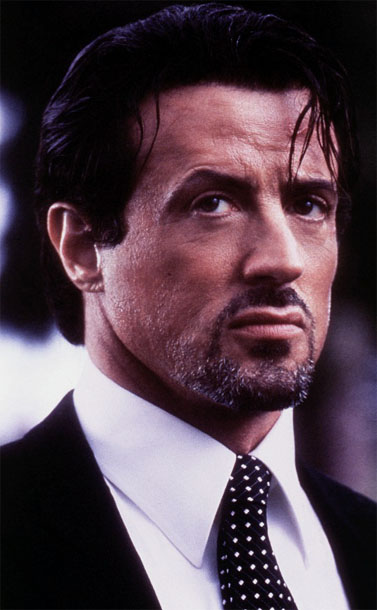Totally busted (2/14/01)
____________
Get Carter. [Stephen Kay, 2000. Screenplay by David McKenna; after a novel by Ted Lewis.]
A remake of the 1971 feature starring Michael Caine [which. however, owes more to Soderbergh’s
The Limey]: when he learns of the purportedly accidental death of his brother in Seattle, Vegas mob enforcer Jack Carter aka Sylvester Stallone — Chili Palmer with larger biceps and less personality — though hitherto not much of a family guy drops everything to go to the funeral; arriving unannounced, he pisses off the bereaved widow [Miranda Richardson] with his relentless rattling of the mourners’ cages but does, sure enough, determine that the accident was staged and that somebody ordered a hit. Suspicion devolves successively upon Michael Caine [whose presence in the film, obviously, is meant to be legitimizing], proprietor of a club where the late lamented hung out; pornomeister Mickey Rourke, now heavily into the videogame market; punk computer billionaire Alan Cumming, who has nebulous dealings with Rourke; and major babe and apparent extracurricular interest of the deceased Rhona Mitra, who must know more than she’s admitting; all of them, naturally, point their fingers at one another. — Meanwhile Stallone is bonding with his niece Rachael Leigh Cook, despite the fact that he’s a badass and she has that thing in her nose. — Presently the smoking gun turns up, in the form of the inevitable computer disk [hint: pornographic video] just as Stallone’s boss in Vegas figures out who’s been humping his girlfriend and dispatches a couple of Sly’s erstwhile colleagues to put the hurt upon him; this necessitates much picturesque violence and several carchases in the rain. — I think the moral of all this is supposed to be that modern billionaires are pussies, but don’t quote me.
Provocative exchanges: “You’re Carter?” “Yes, and you really don’t want to know me.” — Rourke to Stallone: “You got my deepest condolences, and all that shit.” Stallone in turn compares Rourke’s eyes to two pissholes in the snow. [At this point you realize that this is a Relationship Movie.] — Stallone to a succession of bitchslapped scumbags: “Tell me what I need to know, or this is going to another level.” — Rourke to Stallone: “You’re going to end up like a onelegged man in an asskicking contest.” — Stallone to Rhona Mitra: “If you’re lying to me, I’ll break every beautiful bone in your body.” [Not bad, actually; nearly good enough for Mickey Spillane.]
The DVD release is equipped with a director’s commentary considerably more interesting than the dialogue track which not only satisfies the viewer’s curiosity regarding the details of the cinematography [i.e. use of color saturation, choice of lenses, sources of compositional quotations], presents a rather labored explanation of the significance of the fragmented editing style [Stallone/Carter’s self-deconstruction], relates the much-repeated mirror motif to this last [self-image], laments the folly of shooting on location in Seattle [rain], points out a variety of continuity errors, provides the solution to the problem created for the soundtrack by enthusiastic fans off-camera screaming “Yo Rocky!!” [looping dialogue in post], and expresses repeatedly the director’s admiration for the size of Stallone’s biceps and his awe at the expense of his wardrobe [five thousand dollars for a silk suit? what would Perelman have done with this?], but solves what would otherwise be the greatest mystery about this opus, namely, why everybody smokes in the first half of the movie and nobody smokes in the second. [Stallone in particular tosses his pack on the counter and pronounces himself a cured addict in the middle of a sentence.] — The answer [as if you couldn’t guess] is that the producers insisted on it. — In fact, one gathers, the producers were constantly seizing the controls from the authors of record — no great surprise, since the credits list thirteen producers against one writer and one director — with the predictable result that the idea that a professional hitman who finishes off the movie by whacking halfadozen people in as many minutes should otherwise comport himself in a manner befitting a role model is hardly the most piquant absurdity to be found herein. But one must expect this, when a story is continuously redesigned by a committee; something about fifty million monkeys and their typewriters comes to mind.
Without Kay’s commentary I probably wouldn’t have noticed that Faye Wong has a song on the soundtrack; he doesn’t seem to realize, however, that whoever picked the music out must have laid this track down under the night scene in the diner in homage to Wong Kar Wai’s
Chungking Express. — A movie in which everybody smokes cigarettes from beginning to end, incidentally; don’t producers watch their dailies in Hong Kong?
____________Citizen Goya (2/11/01)

